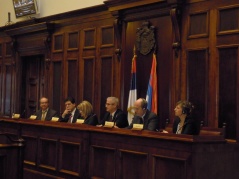National Assembly of the Republic of Serbia / Activities / Activity details

7 February 2012 Presentation the Report “Law Drafting and Legislative Process in the Republic of Serbia: An Assessment"
Tuesday, 7 February 2012
Presentation of Law Drafting and Legislative Process in the Republic of Serbia
Today, the National Assembly House hosted the presentation of the Report titled “Law Drafting and Legislative Process in the Republic of Serbia: An Assessment", co-drafted by the Legislative Committee and OSCE - ODIHR (OSCE Office for Democratic Institutions and Human Rights).
The gathering was opened the Chairman of the National Assembly’s Legislative Committee Vlatko Ratkovic, while the Speaker of the National Assembly of the Republic of Serbia Prof. Dr Slavica Djukic Dejanovic greeted the OSCE representatives and other participants. She stressed that the gathering was important for all the participants of the legislative process and would help to further nurture the spirit of parliamentarism in future work.
Addressing the gathering, the Director of the OSCE Office for Democratic Institutions and Human Rights (ODIHR), Ambassador Janez Lenarcic opined that the invitation the National Assembly extended to the OSCE to take part in the assessment of the law-making process proves how important it is for a parliament to have an open, transparent and democratic legislative process. He emphasised that the legislative and law-making reform process is long-term and requires political support and participation of both state institutions and the non-governmental sector.
Deputy Head of the OSCE Mission to Serbia Thomas Moore reminded that the OSCE’s activities in Serbia aspire to involve the citizens and civil society into the parliament’s work. He reminded that Serbia had adopted more than 700 laws and was successfully implementing the reform process of the legal system.
Thomas Vennen, Head of the OSCE ODIHR Democratisation Department, spoke about the work of the ODIHR relating to legislative processes and regulation management issues. He deemed that the Legislative Committee, with the support of the National Assembly Speaker, has recognised the importance of the legislative system reform for Serbia’s European integration process.
Marta Achler, Chief of the ODIHR Legislative Support Unit, briefed the participants on the Report assessing the law drafting and legislative process in Serbia, as well as the methodology and further activities. According to her, the Report is not a goal unto itself, but it rather opens up room for further activities. The Report contains recommendations, not final solutions some of which, she stressed, we have to find ourselves. Marta Achler announced that the Legislative Committee would organise workshops in what are considered priority spheres such as consultations with the public when drafting laws, National Assembly’s oversight role, cooperation and coordination between the legislative and executive power and the very process of drafting and passing laws.
Legislative Committee Chairman Vlatko Ratkovic spoke of the role the Legislative Committee plays in the legislative process and motivation to work on the Assessment. He emphasised the importance of amendments for the finalised legislation adding that, according to statistics, they are mostly submitted by opposition MPs. Legislative drafting methodology is, according to him, very important for the quality of laws. Ratkovic said that the next legislature could expect a more significant participation of the non-governmental sector, particularly after the adoption of the law on referendum and civil initiative.
At the end of the presentation, ODIHR experts, professors John Bates and Lucius Mader detailed the most important findings and recommendations of the assessment of the law drafting and legislative process in Serbia which was followed by a discussion.
-
11.00 - the Head of the PFG with Cuba meets with the Cuban Ambassador to Serbia (National Assembly House, 13 Nikola Pasic Square, hall 2)
-
12.00 - the Chairman of the Committee on Education, Science, Technological Development and the Information Society meets with the Ombudsman (National Assembly House, 13 Nikola Pasic Square, hall 4)
-
13.00 - sitting of the Committee on Spatial Planning, Transport, Infrastructure and Telecommunications (National Assembly House, 13 Nikola Pasic Square, hall 2)




